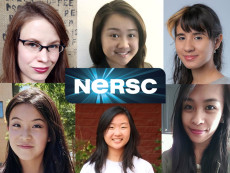NERSC Student Cluster Competition Team Ready for ISC17
June 14, 2017

Top row, left to right: Tiffany Connors, Kristi Arroyo and Grace Rodriguez Gomez. Bottom row, left to right: Yong Li Dich, Ruoyun Zheng and Elizabeth Wang.
Five former interns and one current student assistant at Berkeley Lab’s National Energy Research Scientific Computing Center (NERSC) are joining forces to participate in the Student Cluster Competition at ISC17, June 18-22 in Frankfurt, Germany, marking only the second time that NERSC has fielded a student cluster competition team.
The all-female contingent will compete against 11 other teams over three days to demonstrate the best performance across a series of benchmarks and applications on a small supercomputer cluster that they designed and built.
Five of the six members were also on NERSC’s ISC16 team:
- Kristi Arroyo, a junior in computer science at the Missouri University of Science and Technology
- Tiffany Connors, who recently graduated from Texas State University with a computer science degree (not on last year’s team)
- Yong Li Dich, a sophomore at Harvard University who plans to pursue computer science
- Grace M. Rodríguez Gomez, who will graduate this summer from the University of Puerto Rico with a computer science degree
- Elizabeth Wang, who just graduated from Monta Vista High School in Cupertino, Calif., and will attend the University of Illinois Urbana-Champaign
- Ruoyun Zheng, who just graduated from Monta Vista High School and will attend Caltech after interning at NERSC this summer for a second time
Also returning as team leader is Rebecca Hartman-Baker, acting group lead for NERSC’s User Engagement Group, who believes “we can build off our experience from last year.”
During the three-day competition, which begins June 19, the teams will run problem sets given to them by the competition organizers, including WRF, a well-known weather modeling application; SPLOTCh, a visualization program for astronomy; Graph500; HPCG; Tensorflow; and FEniCS.
Hartman-Baker and the team again worked closely with their sponsors, Intel and Cray, to select and procure the parts they used to build their cluster, which features six nodes plus an Intel NUC that serves as the head node. The team is also using the Open HPC software stack and SPAC for software management and installation.
Connor, who is working as a student assistant at NERSC this summer optimizing throughput for single-node jobs, said she hasn’t participated in a student cluster competition before, “but I’m really interested in HPC and I thought the competition sounded interesting.”
Arroyo, who says participating in the competition is helping build her skills in parallel computing, is excited about the addition of the Tensorflow challenge this year. “The use of neural networks is increasing, and I like that we’re being exposed to that,” she said.
Zheng and Rodriguez are looking forward to meeting more inspiring people, one of their favorite parts about being at the conference last year. “Despite this being a ‘competition,’ I think we all were facing similar problems and were able to connect with each other, even with all of our differences,” Zheng said.
“This competition is mostly to give students experience and more knowledge instead of having them just compete for a trophy,” Rodriguez added.
Wang says that while some people dislike the high-pressure environment of this sort of event, “I enjoy pushing myself to work a little harder, a little faster and a litter smarter to solve a problem within the allocated amount of time,” she said. She also wants “to prove to all the doubters that I am more than my gender and age, and that I am just as capable as anyone else, including the adult males, in the competition.”
The team is also hoping to garner the title of "fan favorite" - click here to vote and you might win the team mascot, "Patches"!
NERSC is a U.S. Department of Energy Office of Science User Facility.
About Computing Sciences at Berkeley Lab
High performance computing plays a critical role in scientific discovery. Researchers increasingly rely on advances in computer science, mathematics, computational science, data science, and large-scale computing and networking to increase our understanding of ourselves, our planet, and our universe. Berkeley Lab’s Computing Sciences Area researches, develops, and deploys new foundations, tools, and technologies to meet these needs and to advance research across a broad range of scientific disciplines.







 Instagram
Instagram YouTube
YouTube